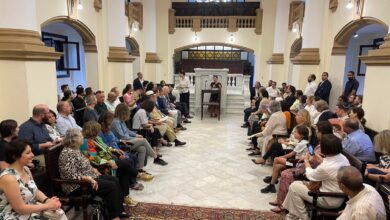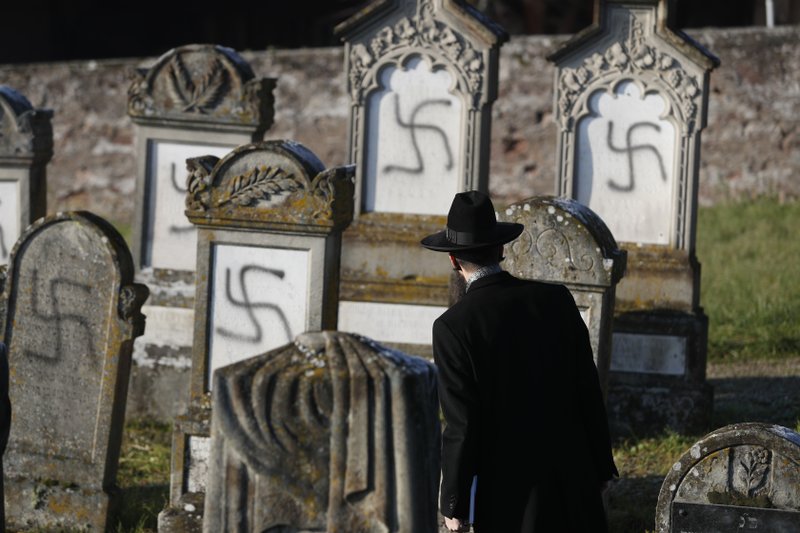Last month, Egypt finalized the restoration of the Maimonides synagogue in Cairo’s "haret el-yahud", its old Jewish Quarter. But the cancellation of the official inaugural ceremony was symptomatic of the uncomfortable, and sometimes tense relationship between the Egyptian state, and its bygone Jewish community.
The cancellation came only one week after a festive religious ceremony took place to consecrate the synagogue on 7 March, in the presence of two Israeli ambassadors, other foreign diplomats and a dozen rabbis; no Egyptian officials were represented, at the choice of the government.
Zahi Hawas, head of the Supreme Council of Antiquities, said the cancellation of the official state celebration, originally scheduled for 14 March, was in response to “provocative” acts during the ceremony that included “dancing and drinking alcohol in the synagogue.” He also subsequently added that the decision comes at a time when “Muslim holy sites in occupied Palestine face assaults from Israeli occupation forces and settlers.”
The LE8.5 million restoration project, fully financed by the state, is the third in a series of Jewish synagogue restorations. For the Egyptian authorities, synagogues are Egyptian antiquities that are disconnected from the regional political environment; a forcible discourse that the Egyptian Jewish community accepts, and which creates a neutral zone of dialogue between Egypt and its Jews. Nevertheless, politics unavoidably resurface.
The linkage between the synagogue re-opening and the events in occupied Palestine was one clear example of this-as it went against that very idea that the Supreme Council of Antiquities has maintained since the renovation process had begun, that Egypt’s synagogues are an entirely local matter: “the Jewish temples are Egyptian temples. If we don’t restore them, it’s a crime,” Hawas told Al-Masry Al-Youm. “Like Pharaonic, Coptic and Muslim antiquities, I gave Jewish antiquities equal attention since I took over in 2002.”
The newly found Egyptian sense of interest and ownership over its Jewish artifacts, places of worship, and community which has been prominently flaunted at every occasion in recent weeks may be genuine-but rather than natural, it is reactive and almost forced.
For the state and its press, it is a compromise between tense regional politics and the knee-jerk ensuing popular rejection regarding anything Jewish on the one hand, and an ongoing archaeological renovation plan and political opportunism on the other. Very few fail to make the connection between last year’s decisions to hasten the pace of synagogue restoration and Minister of Culture Farouk Hosni’s bid to the presidency of UNESCO.
For many citizens and independent observers, this "ownership" is a reaction to outside expressions of interest, by Egyptian or other Jews abroad-and consequently a way to discard implicit accusations of ‘collaboration’ against the country’s interests.
Of 11 registered synagogues by the SCA, three have been restored so far, and six are under ongoing review. The registration of buildings under the SCA is regulated by the law for the preservation of monuments, which stipulates that the building is at least 100 years old. An exception for this rule is made if the building has a particular historic or architectural relevance.
While the dwindling Jewish community in Egypt-whose members are estimated to be in the double digits-is engaged in the process of preserving relics of its history, the SCA maintains that it is restoring Jewish antiquities out of its own free will. “The interest in restoring Jewish antiquities has been the initiative of the SCA. We coordinate with the Jewish community just like we coordinate with the Ministry of Religious Endowments when we restore Islamic monuments. We deal with them as Egyptians, regardless of their religion,” said Mohsen Abdel Rahman , general manager of Jewish antiquities at the SCA.
Abdel Rahman also spoke about the question of Egypt’s image abroad. “There has been some wrong information that Jewish antiquities in Egypt are neglected. It’s mostly bad press that knows nothing about reality. The Maimonides synagogue in particular has been referenced in international press as a neglected Jewish site while we’ve been working on it for over a year.”
The Maimonides synagogue is named after renowned Andalusian Arabophone philosopher and physician Moses Ben Maimoun, whose family had settled in Egypt and who worked and studied, until his death, at the attached religious school-the yeshiva-that now bears his name.
Commenting on Hawas’ decision to cancel the official inauguration, Abdel Rahman said it was a normal response to public opinion rather than a political act on its own. “People’s sentiments are not automatic and cannot be controlled. Officials can’t control those sentiments. They have to respect them. It’s abnormal that our neighbors are suffering and that we make a celebration at home.”
Hawas himself reiterated, “I am not a politician. I am a scientist. My job is to restore antiquities of Egypt.”
For the Jews of Egypt, residing both inside and outside the country nowadays, the restorations are a good gesture. “Restoring the synagogues cheered up many Egyptian Jews in the Diaspora, since they have good memories there and they felt that their memories are being preserved. This includes in general a human reconciliatory stance,” said a Jewish woman of Egyptian origins, who chose to remain anonymous. “Ninety percent if not more of Egyptian Jews felt they were Egyptians, and nothing else.”
The reconciliatory stance she referred to is the aftermath of the mass expulsion of the Jews of Egypt in the 1950s following the tripartite aggression of the Suez Canal in 1956 of which Israel was a part.
But nowadays, nostalgia is what prevails from this abrupt departure. “Nostalgia is having the upper hand although some bitterness is sometimes there,” she said.
The religious inauguration ceremony of the Maimonides synagogue was also the occasion for many Jews of Egyptian descent living abroad to return to the country of their childhood, some for the first time since they left. For London-based Ninette Askenazi-Levy, "it’s been a tough ride." Levy left Egypt with her family in 1956 and only returned last month, more than half a century later. As she shared her story, her cheerful laugh made room for a cracked voice. "And I didn’t think I had any tears left…"
Besides attending the consecration ceremony, Levy’s personal journey took her to the streets she walked as a child and as a teenager, growing up in downtown Cairo. She attempted to reconnect with some long lost schoolmates, who were often impossibly difficult to find. "And let’s face it, there aren’t many 70-year-olds left,” she said.
Besides the general thoughts of some Jews from afar and the proactive step of others to come and revisit the past, some Egyptian Jews play a more organized role in their attempt to define relations. “We are in contact with the Egyptian authorities because we hope that the memory of our community does not disappear in Egypt. We believe it was an important community for Egypt,” said Yves Fedida, co-founder of the Nebi Daniel International Association, an Egyptian Jewish heritage preservation group.
One of its goals is to collect Jewish Egyptian archives and registries that were managed by the religious community system of the millets during the Ottoman Empire. “There is nothing that could hurt Egypt here especially that this archival collection won’t be used for any financial demands [by the Jews of the Diaspora],” Fedida told Al-Masry Al-Youm in a telephone conversation from France, where he resides. According to him, financial reclamations from the Egyptian state have already been made by some Egyptian Jews through court cases. But such registers, particularly the bar/bat-mitzvah (coming of age ceremony) and religious marriage registers, are key to the community, because they guarantee the religious transmission and the documentation of the community’s life in general.
“We would also like to see a Jewish museum or a memorial space where people can see aggregations of documents, pictures and films about the Jewish community in Egypt and Alexandria,” he said. “It could be set in a synagogue or in a more vast space. There’s a Coptic museum in Egypt; I don’t see why there should not be a Jewish museum that would be solely about the Jews of Egypt.”
Fedida, who was born in Alexandria in 1945 and left in 1956, recalled that there are political considerations in the association’s dialogue with the Egyptian state. “[The authorities] have been listening to us. There are no agreements yet, but there is no categorical rejection, especially with regard to the idea of the museum.”
The restoration of Jewish cemeteries, especially those of the deteriorating Bassatine cemetary, at the outskirts of Cairo’s southern neighborhood of Maadi, is another site of interest for the association, according to Fedida. The ancient cemetery is in a poor state-with the occasional garbage mound from the neighbors, sewage erupting amidst the tombs and vandals sometimes devastating tombstones. Parts of the graveyard have been used for housing construction.
In his recent trip to Cairo to attend the Maimonides synagogue opening with his children, Fedida wrote an emotional four-page essay about the visit. He signed off the document by writing, "this kindness, unique and examplary for all the region’s countries, is Egypt’s affirmation that our identity (as Jews) is part of its own. It’s a first step on a long road. And we only remember the first step which, in fact, only the road matters."



